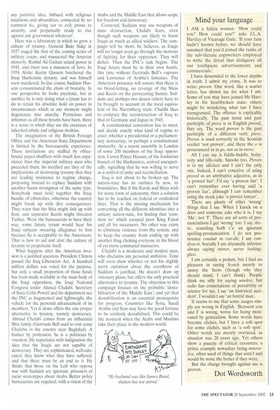Mind your language
I AM a fallen woman. 'How could you? How could you?' asks J.L.A. Hartley of Vicarage Gate. 'If your fans hadn't known better, we should have assumed that you'd joined the ranks of the sub-literate copywriters employed to write the drivel that disfigures all our toothpaste advertisements and commercials.'
I have descended to the lower depths in truth. I admit my crime. It was to write: proven. One word, like a scarlet letter, has shown me for what I am. Some of you may have joined Mr Hartley in his heartbroken state; others might be wondering what law I have transgressed. The offence is explicable historically. The past tense and past participle of prove is in English proved, they say. The word proven is the past participle of a different verb, preve. Proven is used correctly in the Scottish verdict 'not proven', and there the o is pronounced as in go, not as in move.
All I can say is fiddle-faddle, hoitytoity and tilly-vally. Snooks too. Proven is in my idiolect and I ain't the only one, Indeed, I can't conceive of using proved as an attributive adjective, as in 'a proved liar': I'd say 'a proven liar'. I can't remember ever having said 'a proven liar', although I can remember using the stock joke 'a proven lawyer'.
There are plenty of other 'wrong' things that I say. When I knock on a door and someone asks who it is, I say 'Me', not 'I'. There are all sorts of pronunciations I get 'wrong' too. I say Arctic, sounding both c's: an ignorant spelling-pronunciation. I do not pronounce conduit as cun-dit; I say condyoo-it. Socially I am abysmally inferior, always saying mirror, never lookingglass.
I am certainly a pedant, but I find no pleasure in saying Scotch merely to annoy the Scots (though why they should mind, I can't think). People think me silly for saying wireless, but radio has connotations of portability or science for me. I say 'an historical accident'. I wouldn't say 'an horrid man'.
It seems to me that some usages simply are wrong in English. 'Between you and I' is wrong, worse for being motivated by genteelism. Some words have become cliches, but I have a soft spot for some cliches, such as 'a soft spot'. Other words are merely overused, as situation was 20 years ago. Yet others show a paucity of critical resources, a prime example nowadays being innovative, often used of things that aren't and would be none the better if they were.
But the charge brought against me is
proven, Dot Wordsworth


































































































 Previous page
Previous page